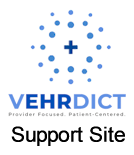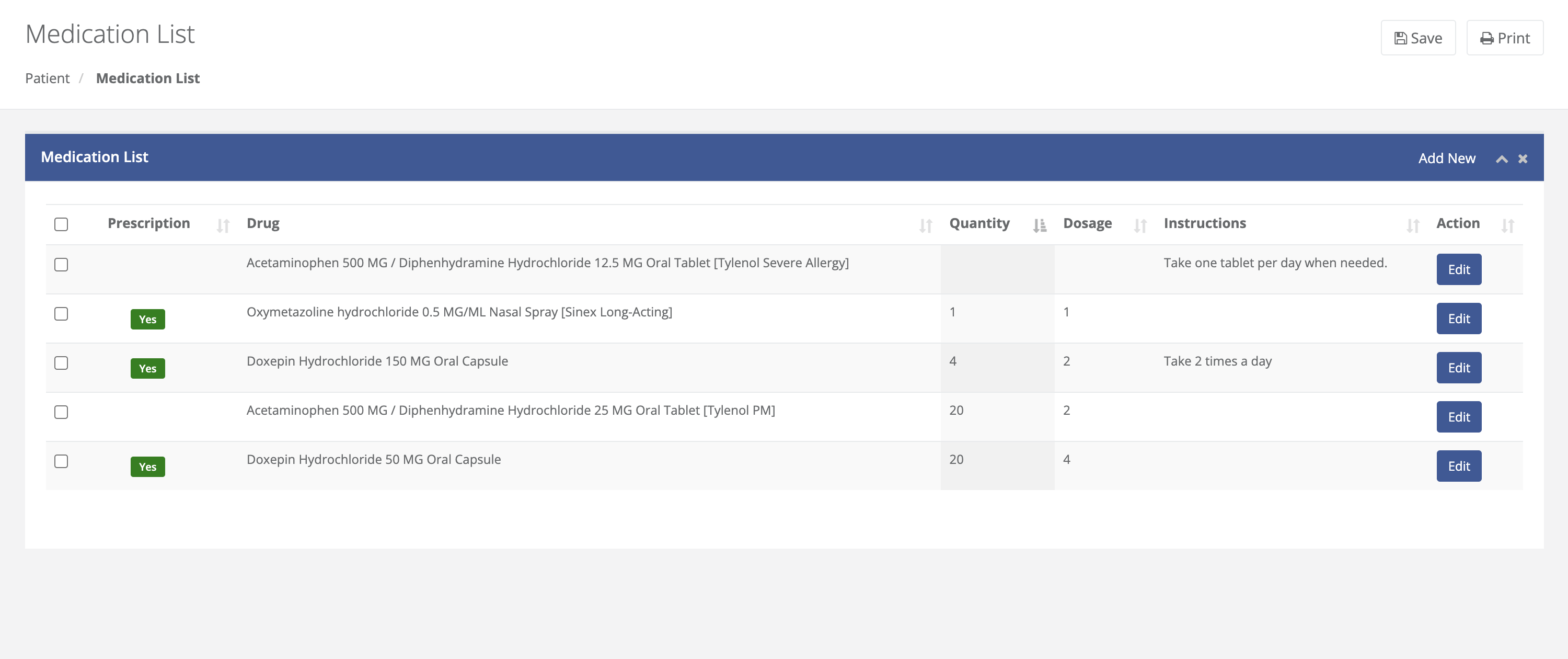Medications: Difference between revisions
No edit summary |
No edit summary |
||
| (2 intermediate revisions by the same user not shown) | |||
| Line 1: | Line 1: | ||
The Medication List in VEHRDICT serves as a comprehensive record of all medications prescribed to a patient, including dosages, frequencies, and duration of treatment. Healthcare providers use this list to review a patient's current and past medications, ensuring accurate and safe prescribing practices, preventing drug interactions, and monitoring adherence to treatment plans. Medications can be entered into the EHR manually by the provider during consultations or automatically updated through integrated pharmacy systems, enhancing accuracy and efficiency in medication management. | |||
[[File:Medication List.png|800px]] | [[File:Medication List.png|800px]] | ||
=== Medication List vs. Prescription List === | === Medication List vs. Prescription List === | ||
| Line 14: | Line 12: | ||
* '''Prescription List''': In contrast, the Prescription List only contains medications that you, as their healthcare provider, have prescribed. It does not include medications prescribed by other providers or non-prescription substances. | * '''Prescription List''': In contrast, the Prescription List only contains medications that you, as their healthcare provider, have prescribed. It does not include medications prescribed by other providers or non-prescription substances. | ||
=== Key Features of the Medication List === | === Key Features of the Medication List === | ||
| Line 30: | Line 29: | ||
* '''Patient Involvement''': Encourage patients to report any over-the-counter medications or supplements they are taking so these can be added to the list for a full picture of their medication profile. | * '''Patient Involvement''': Encourage patients to report any over-the-counter medications or supplements they are taking so these can be added to the list for a full picture of their medication profile. | ||
=== Conclusion === | === Conclusion === | ||
The '''Medication List''' page is an essential aspect of patient care management. It helps in creating an accurate and full picture of a patient's medication regimen, ensuring safety and efficacy in their treatment. By using this tool effectively, healthcare providers can improve communication, avoid harmful drug interactions, and deliver the highest quality of care. | The '''Medication List''' page is an essential aspect of patient care management. It helps in creating an accurate and full picture of a patient's medication regimen, ensuring safety and efficacy in their treatment. By using this tool effectively, healthcare providers can improve communication, avoid harmful drug interactions, and deliver the highest quality of care. | ||
Latest revision as of 17:42, 22 July 2024
The Medication List in VEHRDICT serves as a comprehensive record of all medications prescribed to a patient, including dosages, frequencies, and duration of treatment. Healthcare providers use this list to review a patient's current and past medications, ensuring accurate and safe prescribing practices, preventing drug interactions, and monitoring adherence to treatment plans. Medications can be entered into the EHR manually by the provider during consultations or automatically updated through integrated pharmacy systems, enhancing accuracy and efficiency in medication management.
Medication List vs. Prescription List
It's important to understand the distinction between the Medication List and the Prescription List.
- Medication List: This list includes all the medications that a patient is currently taking, including over-the-counter drugs, supplements, and prescriptions from all healthcare providers. It's a snapshot of a patient’s actual medication use.
- Prescription List: In contrast, the Prescription List only contains medications that you, as their healthcare provider, have prescribed. It does not include medications prescribed by other providers or non-prescription substances.
Key Features of the Medication List
1. Complete Medication Information: You'll see the name, dosage, and quantity of each medication. Brand names are included where applicable to avoid any confusion.
2. Dosage and Frequency: Specific instructions on how each medication should be taken are provided. This includes the number of doses per day and any special instructions, which are critical for ensuring that the patient follows the regimen correctly.
3. Actionable Items: Each medication has an associated 'Edit' button, allowing for easy updates or changes to the medication details as needed.
Best Practices
- Verification: Always verify that the medications listed are current and accurate. This helps in preventing any potential drug interactions or duplications.
- Updates: Make sure to update the list promptly with any changes in the patient’s medication regimen to keep it current.
- Patient Involvement: Encourage patients to report any over-the-counter medications or supplements they are taking so these can be added to the list for a full picture of their medication profile.
Conclusion
The Medication List page is an essential aspect of patient care management. It helps in creating an accurate and full picture of a patient's medication regimen, ensuring safety and efficacy in their treatment. By using this tool effectively, healthcare providers can improve communication, avoid harmful drug interactions, and deliver the highest quality of care.

